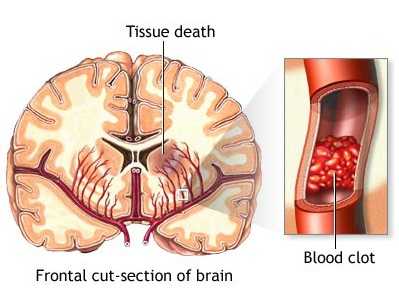About Stroke

A stroke happens when a blood clot blocks blood flow to the brain. This causes brain tissue to become damaged or die.
A stroke, sometimes called a brain attack, occurs when something blocks blood supply to part of the brain or when a blood vessel in the brain bursts. In either case, parts of the brain become damaged or die. A stroke can cause lasting brain damage, long-term disability, or even death.
Learn more about what causes stroke and what happens during a stroke.
Understanding Stroke
To understand stroke, it helps to understand the brain. The brain controls our movements, stores our memories, and is the source of our thoughts, emotions, and language. The brain also controls many functions of the body, like breathing and digestion.
To work properly, your brain needs oxygen. Although your brain makes up only 2% of your body weight, it uses 20% of the oxygen you breathe.1 Your arteries deliver oxygen-rich blood to all parts of your brain.
What Happens During a Stroke
If something happens to block the flow of blood, brain cells start to die within minutes because they can’t get oxygen. This causes a stroke.
There are two types of stroke:
- An ischemic stroke occurs when blood clots or other particles block the blood vessels to the brain. Fatty deposits called plaque can also cause blockages by building up in the blood vessels.
- A hemorrhagic stroke occurs when a blood vessel bursts in the brain. Blood builds up and damages surrounding brain tissue.
Both types of stroke damage brain cells. Symptoms of that damage start to show in the parts of the body controlled by those brain cells.
Quick Treatment Is Critical for Stroke
A stroke is a serious medical condition that requires emergency care. Act F.A.S.T. Call 9-1-1 right away if you or someone you are with shows any signs of a stroke. Time lost is brain lost. Every minute counts.
More Information
From CDC:
- Stroke [PDF–548K]
- Know the Facts About Stroke [PDF–264K]
- Know the Signs and Symptoms of Stroke [PDF–268K]
- Women and Stroke [PDF–268K]
- Men and Stroke [PDF–248K]
- African-American Women and Stroke [PDF–910K]
- African-American Men and Stroke [PDF–478K]
- Hispanic Women and Stroke [PDF–327K] – Las Mujeres Hispanas y Los Accidentes Cerebrovasculares [PDF–223]
- Hispanic Men and Stroke [PDF–340K] – Los Hombres Hispanos y Los Accidentes Cerebrovasculares [PDF–221]
- Hispanics and Stroke [PDF–217K] – Las Personas Hispanas y Los Accidentes Cerebrovasculares [PDF–223]
From other organizations:
- What You Need to Know About Stroke–National Institute of Neurological Disorders and Stroke
- Know Stroke: Know the Signs. Act in Time.–National Institutes of Health
- Mind Your Risks–National Institutes of Health
- Stroke–Medline Plus
- Brain Health Resource Page–American Heart Association/American Stroke Association
- Internet Stroke Center
- What is Stroke?–National Stroke Association
Reference
- National Institute of Neurological Disorders and Stroke. (2005). The brain: our sense of self [PDF-11M].
- Page last reviewed: December 28, 2016
- Page last updated: December 28, 2016
- Content source:



 ShareCompartir
ShareCompartir